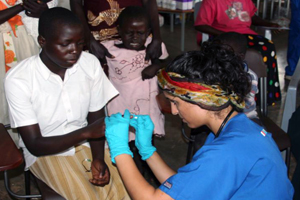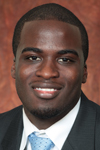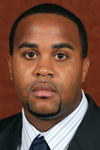|
ANOTHER DEMEHRI
BYLINE
 An
article by Natasha Demehri, Class of 2012, fills most of the front
cover of the Winter 2011 AAFP International Update Newsletter. The
editor asked her to write something based on her poster presentation at the
Global Health Workshop in Coral Gables last year. So she produced the
article
"Being the Change: Ending 'Duffle-Bag' Medicine." An
article by Natasha Demehri, Class of 2012, fills most of the front
cover of the Winter 2011 AAFP International Update Newsletter. The
editor asked her to write something based on her poster presentation at the
Global Health Workshop in Coral Gables last year. So she produced the
article
"Being the Change: Ending 'Duffle-Bag' Medicine."
Natasha wrote about the trip she and others from
the College of Medicine took to post-war Northern Uganda in 2009. They
didn't just swoop in for a few days and then leave. In addition to treating
more than 1,700 patients, they also spent important time with the clinical
officers, Uganda's version of U.S. physician's assistants. "Our most
sustainable impact," she wrote, "was teaching the clinical officers through
classes in infectious disease and medical care, permitting them to care for
the local community after we left."
She concluded her article: "The impact of
sustainable care must be recognized as the most priceless asset that we
carry with us."
(Last year, Natasha wrote another piece on her
trip to Uganda. It appeared in the
January 2010
edition of EMR.)
STUDENT-ARTIST
Zach Folzenlogen, Class of
2013, submitted a piece of art titled "Reinvent Yourself" that has been
accepted for publication in Academic Medicine. Last year, his art was
featured on the cover of Developmental Cell.
POSTERS, ETC.
Brett Thomas, Class of
2014, presented the poster "Contributors to Success: Black Males in Medicine"
with Associate Professor Eron Manusov, M.D., at the National Rural Health Association Annual
Multiracial and Multicultural Conference in Tucson.

Geden Franck, Class of 2014 (pictured here), also presented a poster
with Eron Manusov, M.D., at the National Rural Health Association Annual
Multiracial and Multicultural Conference in Tucson. His poster was "The
Effect of Socio-Economic Status and Race on Patient-Physician Trust Levels
in Neighboring Gadsden and Leon County."
Brett Thomas also was one of the authors of an article accepted to Academic
Medicine: "Contributors to Success: Black Males in Medicine." The other
authors were Eron Manusov and Assistant Dean Helen Livingston, Ed.D.
POETRY
This is the
poem that Rashad Sullivan, Class of 2013, read aloud at the Feb. 1 meeting
in the auditorium.
How Far
We Have Not Come
(Essays
poetry and discourse of love and progression)
by Rashad J.
Sullivan
 The
road to nowhere leads to the coveted distension of evolution?s dimensions
outside the boundaries of our soul?s relentless need to fill the void of our
understanding of our beginnings? look how far we have yet to evolve our
thinking? The
road to nowhere leads to the coveted distension of evolution?s dimensions
outside the boundaries of our soul?s relentless need to fill the void of our
understanding of our beginnings? look how far we have yet to evolve our
thinking?
From spoken word into existence the persistence of darkness evades the
scope of our vision to see how far from which we came in light of the sight
of seeing the mistakes we made?
Lapidation for our transgressions in waiting with hopes that we would
sin no more once we cease to exist? how far have those stones been thrown
that they would miss the intent of their meaning and not restore the souls
of those being stoned?look at how far we have not come to justice
Color barriers are often crossed when stereotypical thoughts are lost
and dropped how long has it been since the last of the strange fruit was
hanged to rot? Over 400 years of oppression continues in the mis-educated
minds of the neglected, how far we have not come to realize a dream deferred
should be protected?
How far we have not come to allow the power of names to lose their
meaning being called nothing is the same as being told you are the very
thing that has no existence and no being?how long must we go on like this?
How long will it be before the length of your journey is filled with the
contingency of compromise and untold truths to evade the telling of lies?
when will the end become the beginning again
Go where you have not gone and do what you have not done to come as far
as you have not come?keeping going a little further your destination is
shorter than the distance between the two lines that divide that which is
good from that which is better?
How far have we not come to let our forever escape the ramparts of our
minds to be forgotten in the days where we have wandered throughout time to
find our legacy in our seeds that were left behind?
We were but we are not anymore?why be less than what you have come this
far to explore
Look at how far you have come and then go some more? I urge you to move
forward in progression.
|




 An
article by Natasha Demehri, Class of 2012, fills most of the front
cover of the Winter 2011 AAFP International Update Newsletter. The
editor asked her to write something based on her poster presentation at the
Global Health Workshop in Coral Gables last year. So she produced the
article
An
article by Natasha Demehri, Class of 2012, fills most of the front
cover of the Winter 2011 AAFP International Update Newsletter. The
editor asked her to write something based on her poster presentation at the
Global Health Workshop in Coral Gables last year. So she produced the
article

 The
road to nowhere leads to the coveted distension of evolution?s dimensions
outside the boundaries of our soul?s relentless need to fill the void of our
understanding of our beginnings? look how far we have yet to evolve our
thinking?
The
road to nowhere leads to the coveted distension of evolution?s dimensions
outside the boundaries of our soul?s relentless need to fill the void of our
understanding of our beginnings? look how far we have yet to evolve our
thinking? 